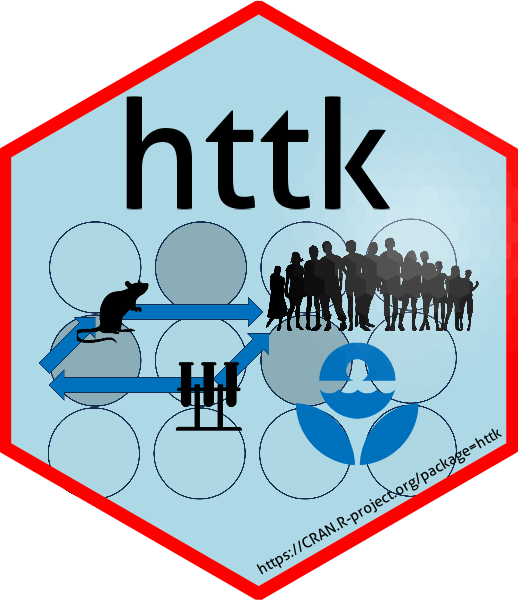

This R package provides data and models for predicting toxicokinetics (chemical absorption, distribution, metabolism, and excretion by the body). The models are design to be parameterized with chemical-specific in vitro (animal free) measurements. The predictions can be used for traditional dosimetry as well as in vivo-in vitro extrapolation (IVIVE) of in vitro bioactivity testing data (for example, ToxCast). See Breen et al. (2021) for a recent review.
This repository is for reporting bugs and contributing enhancements. Installable files, documentation, and other information can be obtained from https://cran.r-project.org/package=httk.
Pre-made models that can be rapidly tailored to various chemicals and species using chemical-specific in vitro data and physiological information. These tools allow incorporation of chemical toxicokinetics (“TK”) and in vitro-in vivo extrapolation (“IVIVE”) into bioinformatics, as described by Pearce et al. (2017). Chemical-specific in vitro data characterizing toxicokinetics have been obtained from relatively high-throughput experiments. The chemical-independent (“generic”) physiologically-based (“PBTK”) and empirical (for example, one compartment) “TK” models included here can be parameterized with in vitro data or in silico predictions which are provided for thousands of chemicals, multiple exposure routes, and various species. High throughput toxicokinetics (“HTTK”) is the combination of in vitro data and generic models. We establish the expected accuracy of HTTK for chemicals without in vivo data through statistical evaluation of HTTK predictions for chemicals where in vivo data do exist. The models are systems of ordinary differential equations that are developed in MCSim and solved using compiled (C-based) code for speed. A Monte Carlo sampler is included for simulating human biological variability (Ring et al., 2017) and propagating parameter uncertainty (Wambaugh et al., 2019). Empirically calibrated methods are included for predicting tissue:plasma partition coefficients and volume of distribution (Pearce et al., 2017). These functions and data provide a set of tools for using IVIVE to convert concentrations from high-throughput screening experiments (for example, Tox21, ToxCast) to real-world exposures via reverse dosimetry (also known as “RTK”) (Wetmore et al., 2015).
UL Research Institutes’ Chemical Insights Research Institute (ULRI-CIRI) is an independent, non-profit research organization (501(c)(3)) dedicated to advancing the understanding of chemical exposures and their impacts on human health. Building on UL’s 130-year legacy in safety science, we are committed to producing peer-reviewed, open-access research that serves as a trusted resource for the public and scientific community. CIRI develops data and tools that adhere to the FAIR principles Wilkinson et al. 2016: Findable, Accessible, Interoperable, and Reusable. Our mission is to provide trustworthy, scientifically grounded predictions of chemical behavior.
We emphasize rigorous scientific peer review, and best practices in software development and engineering: 1. Wherever possible, we integrate existing, peer-reviewed data and tools. 2. When creating new data or methods, we submit them to external peer review to ensure quality and credibility. 3. We try to make our research open-source where possible, and use continuous integration and testing to ensure high-quality software
Our goal is to inform standards, support evidence-based decision-making, and protect public health. We are passionate about advancing scientific discovery and applying it to real-world health challenges.
Visit the ULRI Chemical Insights website for more information and our latest research updates.
For an introduction to R, see Irizarry (2022) “Introduction to Data Science”: http://rafalab.dfci.harvard.edu/dsbook/getting-started.html
For an introduction to toxicokinetics, with examples in “httk”, see Ring (2021) in the “TAME Toolkit”: https://uncsrp.github.io/Data-Analysis-Training-Modules/toxicokinetic-modeling.html
install.packages("X")Or, if using RStudio, look for ‘Install Packages’ under ‘Tools’ tab. * Note that R does not recognize fancy versions of quotation marks ‘,\(~\)’,\(~\)“, or\(~\)”. If you are cutting and pasting from software like Word or Outlook you may need to replace the quotation marks that curve toward each other with ones typed by the keyboard.
Adapted from Breen et al. (2021)
install.packages("httk")Load the HTTK data, models, and functions
library(httk)packageVersion("httk")get_cheminfo()get_cheminfo(info = "all", median.only=TRUE)"80-05-7" %in% get_cheminfo()subset(get_cheminfo(info = "all"), Compound %in% c("A","B","C"))calc_mc_oral_equiv(0.1,chem.cas = "34256-82-1",species = "human")
calc_mc_oral_equiv(0.1,chem.cas = "99-71-8", species = "human")calc_tkstats(chem.cas = "34256-82-1",species = "rat")
calc_tkstats(chem.cas = "962-58-3", species = "rat")solve_pbtk(chem.name = "bisphenol a", plots = TRUE)my_data <- subset(get_cheminfo(info = "all"), Compound %in% c("A","B","C"))write.csv(my_data, file = "my_data.csv")help(httk)help(package = httk)vignette(package = "httk")vignette("IntroToHTTK")John Wambaugh [wambaugh.research@gmail.com]
Caroline Ring [Ring.Caroline@epa.gov]
Robert Pearce, Sarah Davidson-Fritz [DavidsonFritz.Sarah@epa.gov] Greg Honda [honda.gregory@epa.gov], Mark Sfeir, Matt Linakis [MLINAKIS@ramboll.com], Dustin Kapraun [kapraun.dustin@epa.gov], Kimberly Truong [truong.kimberly@epa.gov], Colin Thomson [thomson.colin@epa.gov], Annabel Meade [aemeade7@gmail.com], and Celia Schacht [Schacht.Celia@epa.gov]
Todor Antonijevic [tantonijevic@toxstrategies.com], Miyuki Breen,
Shannon Bell [Shannon.bell@inotivco.com], Xiaoqing Chang
[Xiaoqing.chang@inotivco.com], Jimena Davis, Elaina Kenyon, Gilberto
Padilla Mercado [PadillaMercado.Gilberto@epa.gov], Katie Paul Friedman
[Katie.PaulFriedman@UL.org], Nathan Pollesch [pollesch.nathan@epa.gov],
Meredith Scherer [Scherer.Meredith@epa.gov], Noelle Sinski
[Noelle.Sinski@icf.com], Nisha Sipes [sipes.nisha@epa.gov], James Sluka
[jsluka@indiana.edu],
Caroline Stevens [Stevens.Caroline@epa.gov], Barbara Wetmore
[wetmore.barbara@epa.gov], and Lily Whipple
Woodrow Setzer
This software/application was initially developed by the U.S. Environmental Protection Agency (USEPA). No warranty expressed or implied is made regarding the accuracy or utility of the system, nor shall the act of distribution constitute any such warranty. The USEPA has relinquished control of the information and no longer has responsibility to protect the integrity, confidentiality or availability of the information. Any reference to specific commercial products, processes, or services by service mark, trademark, manufacturer, or otherwise, does not constitute or imply their endorsement, recommendation or favoring by the USEPA.